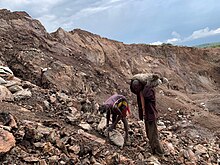Our website is made possible by displaying online advertisements to our visitors.
Please consider supporting us by disabling your ad blocker.
Exploitation of natural resources
The exploitation of natural resources describes using natural resources, often non-renewable or limited, for economic growth[1] or development.[2] Environmental degradation, human insecurity, and social conflict frequently accompany natural resource exploitation. The impacts of the depletion of natural resources include the decline of economic growth in local areas; however, the abundance of natural resources does not always correlate with a country's material prosperity. Many resource-rich countries, especially in the Global South, face distributional conflicts, where local bureaucracies mismanage or disagree on how resources should be used. Foreign industries also contribute to resource exploitation, where raw materials are outsourced from developing countries, with the local communities receiving little profit from the exchange. This is often accompanied by negative effects of economic growth around the affected areas such as inequality and pollution[3]
The exploitation of natural resources started to emerge on an industrial scale in the 19th century as the extraction and processing of raw materials (such as in mining, steam power, and machinery) expanded much further than it had in pre-industrial areas. During the 20th century, energy consumption rapidly increased. Today, about 80% of the world's energy consumption is sustained by the extraction of fossil fuels, which consists of oil, coal and natural gas.[4]
Another non-renewable resource humans exploit is subsoil minerals, such as precious metals, mainly used to produce industrial commodities. Intensive agriculture is an example of a mode of production that hinders many aspects of the natural environment, for example the degradation of forests in a terrestrial ecosystem and water pollution in an aquatic ecosystem.[5] As the world population rises and economic growth occurs, the depletion of natural resources influenced by the unsustainable extraction of raw materials becomes an increasing concern.[5] The continuous alteration of the environment through water, mineral, and forest exploitation poses increased risks of climate-based displacement and conflict stemming from scarcity, which threaten to perpetuate social inequities.[3]

- ^ Cronin, Hemang . (2011). "Natural Resources and the Development-Environment Dilemma Archived 2016-03-05 at the Wayback Machine." Exploiting Natural Resources. The Henry L. Stimson Centre. p. 63.
- ^ Cronin, Richard; Pandya, Amit (2009). "Exploiting Natural Resources: Growth, Instability, and Conflict in the Middle East and Asia" (PDF). STIMSON Pragmatic Steps for Global Security.
- ^ a b "Climate and Environmental Security in the Democratic Republic of Congo | DGAP". dgap.org. Retrieved 2024-04-23.
- ^ Planas, Florent. "The Exploitation of Natural Resources". Un An Pour La Planete. Archived from the original on 12 November 2012. Retrieved 22 March 2012.
- ^ a b McNicoll, Geoffrey (2007). "Population and Sustainability" (PDF). Handbook of Sustainable Development. Edward Elgar Publishing. pp. 125–39. Archived from the original (PDF) on 2012-03-11. Retrieved 2012-03-13.
Previous Page Next Page
استغلال المصادر Arabic Explotación económica Spanish بهرهبرداری منابع طبیعی FA Gestion des ressources naturelles French Prekomjerno iskorištavanje resursa Croatian Բնական ռեսուրսների շահագործում HY Eksploitasi sumber daya alam ID Fitrandrahana ny harena voajanahary MG പ്രകൃതിവിഭവങ്ങളുടെ ചൂഷണം Malayalam Exploitatie Dutch


